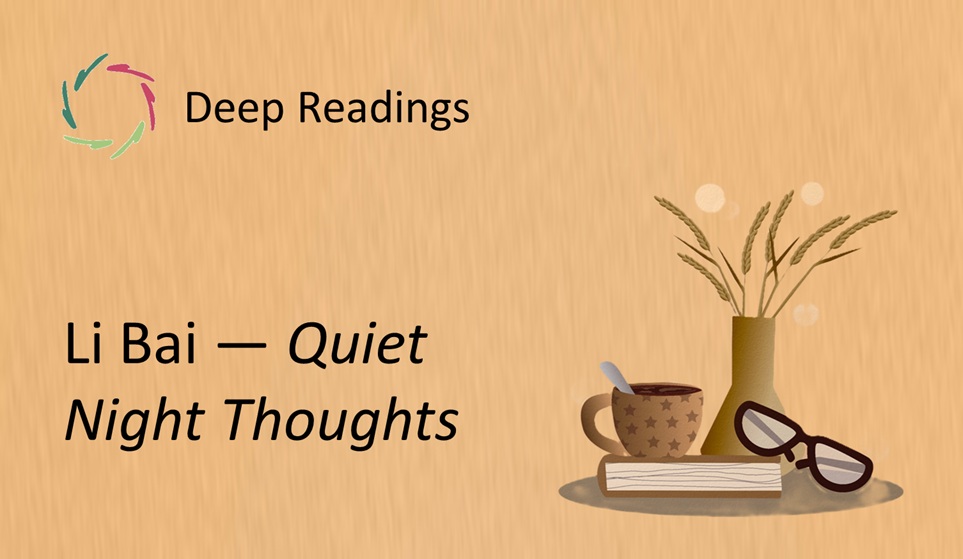Deep Readings: Li Bai – Quiet Night Thoughts

The Fragment
Original (Chinese):
床前明月光,
疑是地上霜。
举头望明月,
低头思故乡。
Pinyin (transliteration):
Chuáng qián míng yuè guāng,
yí shì dì shàng shuāng.
Jǔ tóu wàng míng yuè,
dī tóu sī gù xiāng.
English rendering (by Lisa):
Before my bed, the bright moonlight —
I thought it was frost upon the ground.
I lift my head and gaze at the bright moon,
I lower my head and think of home.
(Public domain, Tang dynasty, 8th century – This is the entire poem)
Contextual Glimpse
Li Bai (701–762) was one of the greatest poets of the Tang dynasty, famed for his lyrical freedom, nature imagery, and longing for transcendence. Quiet Night Thoughts is one of his most beloved poems, often memorized by Chinese children as their first encounter with poetry. In four simple lines, Li Bai evokes the feeling of gazing at the moon in solitude and being carried into homesickness.
The Tang dynasty valued poetry as both art and communication, and Li Bai’s verse reflects the blend of clarity and depth that defines classical Chinese lyric. The moon, a frequent image in his poetry, becomes here not only a celestial presence but also a bridge to memory and belonging. The poem is brief, yet it carries an immense emotional horizon: the moonlight as frost, the gaze upward, the thought of home.
Resonance
The fragment conveys how a single image can open into vast emotion. The moonlight is at once a natural phenomenon, an illusion of frost, and a trigger for memory. Li Bai compresses perception, imagination, and longing into four short lines. His poem embodies the classical Chinese ideal that great truth lies in simplicity.
This resonates because each of us knows moments when a sight — the moon, a tree, a sound — suddenly unlocks a wave of feeling. The act of looking becomes the act of remembering. The poem’s power lies in its restraint: nothing is explained, but everything is felt. The moon is both there in the sky and inside the heart.
Why this may also be about you
This poem is not only about Li Bai gazing at the moon far from home. It may also be about your own moments of separation, when something in nature stirred a longing for connection. The quiet image of the moonlight reminds you that even when far away, your heart seeks its own home.
Perhaps you, too, have looked at the moon and thought of someone or someplace you love. The poem assures you that such feelings are universal — what you feel in solitude has been felt by countless others, across centuries. In this way, the moon becomes a companion to your longing, a witness who travels with you wherever you are.
Lisa’s inspired, original idea about this fragment
Perhaps the moon in this poem is not only a distant object but also a mirror. It reflects back to us our own inner light, often unnoticed until seen in solitude. The moonlight that seems like frost is a reminder that perception itself is creative: what we see is shaped by how we feel.
In this way, the moon teaches us that longing is not emptiness but presence in another form. To think of home is not only to miss it, but to keep it alive within you. The moonlight becomes the bridge between here and there, presence and absence.
Echoes
Li Bai’s poem has echoed for over a thousand years in Chinese culture. It is recited at festivals, taught in schools, and sung in songs. For Chinese people abroad, it often becomes a tender symbol of homesickness, uniting generations. The moon itself remains a shared emblem: during the Mid‑Autumn Festival, families still gather to look at it together, recalling verses like these.
Beyond China, the poem has been translated into dozens of languages, admired for its brevity and universality. Readers everywhere recognize in it the same feeling: to look at the moon and think of home. Its echo shows that a few words, perfectly placed, can bridge worlds and centuries.
Inner Invitation
Close your eyes and imagine moonlight spilling onto the floor at your feet. Let it seem almost like frost, pale and quiet. Now lift your head inwardly, as Li Bai does, and picture the moon. Lower your head again, and notice what comes to mind — perhaps a person, perhaps a place, perhaps a time that feels like home.
Let yourself rest with that memory. Feel that the moonlight is not only outside but also within you, illuminating what you hold dear. Breathe with this light, letting it soften your sense of distance.
Closing Note
Li Bai shows us that even the simplest image — moonlight before a bed — can open into infinite depth. His poem reminds us that home lives not only in place, but in the light that connects us across time and distance.
Keywords
moon, longing, homesickness, memory, simplicity, Li Bai, Tang, nature, presence, absence, reflection


